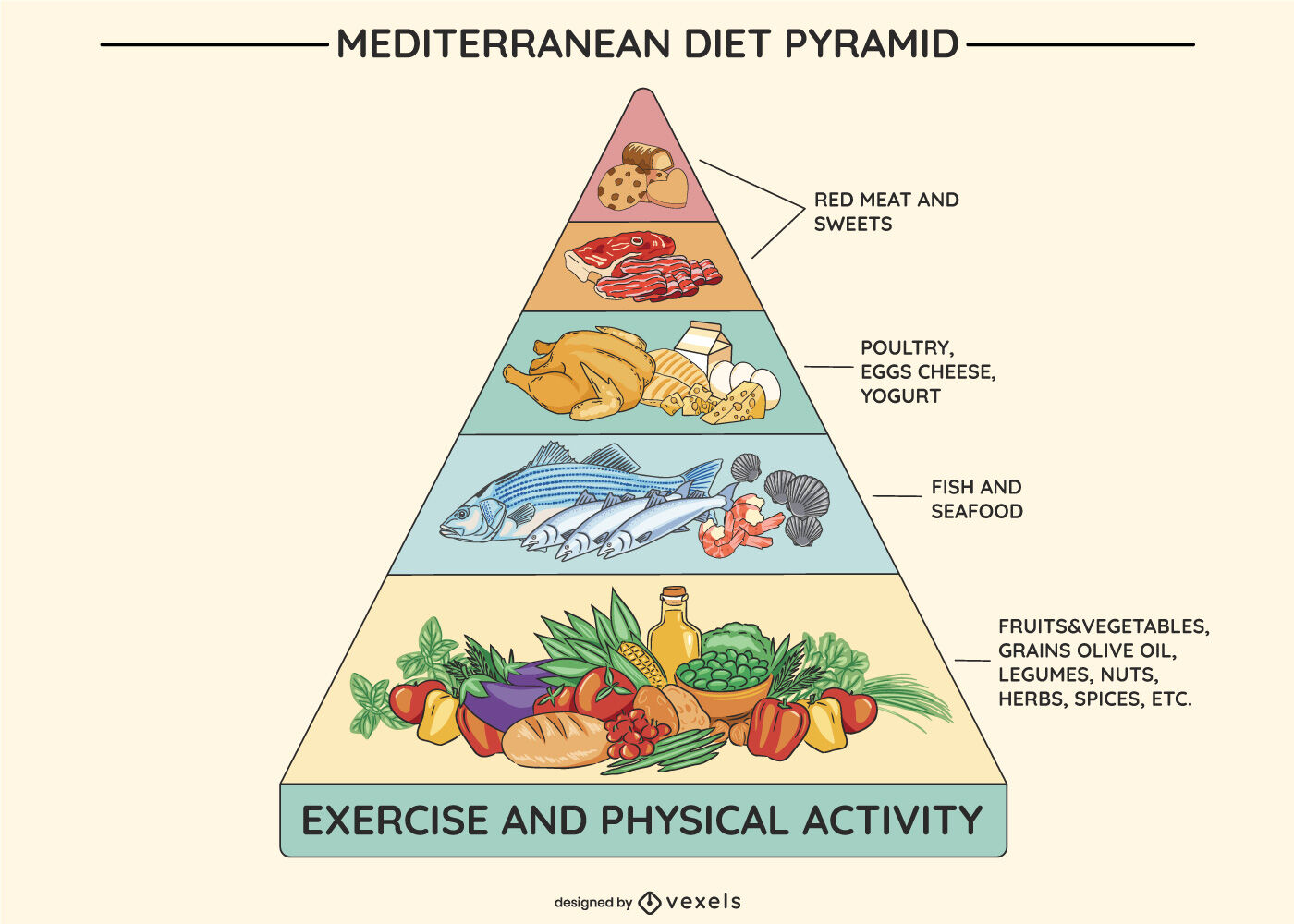Lecture 1 - History of Med. Diet
1/44
There's no tags or description
Looks like no tags are added yet.
Name | Mastery | Learn | Test | Matching | Spaced | Call with Kai |
|---|
No analytics yet
Send a link to your students to track their progress
45 Terms
Ranking of Mediterranean Diet
#1 for many health conditions like diabetes, arthritis; weight loss
What does the diet limit?
Saturated and trans fats, sugar, and processed foods
Examples of Food in Diet
Fish, olive oil (healthy lipid), beans/legumes, whole grains, poultry, veggies
Why was the diet started?
Rising number of death from CHD found by 7 Countries Study
7 Countries Study:
Fat causes CHD
Increasing rate of CHD deaths
Lowest death rate was in the Mediterranean
Mediterranean Diet Pyramid

Geography of Greece
Mostly mountainous, many islands, with mild/rainy winter and dry/hot summer
Biodiversity of Greece
Many endemic plants due to various micro-climates and being unglaciated
Mountain Tea
From Sideritis plant; herbal and caffeine free used to be used to heal wounds
Neolithic Age Key Points
Building houses/villages
Diversion of language
Olives and wine production
Veggie and fruit processing
FOUNDATIONS of Med. Diet
Bronze Age Civilizations
Minoans on Crete
Cycladic on Cyclades
Myceneans on mainland
Trojan War
During Bronze Age for passage to Black Sea; inspired myth
Production in Bronze Age
Cultivating many plants, fruits, nuts, olives, etc.
First production of olive oil, honey, and cheese (feta)
Myth of feta from cyclops & goat milk
Souvlaki was made
Cooking in Bronze Age
Everything we do today (boiling, steaming, etc.)
Social Traditions with Food in Bronze Age
Public and private feasts to build community and social connections
Archaic Period
End of the Persian Wars
Greek alphabet; Athens and Sparta established
Classical Period
Death of Alexander the Great; Democracy
Agriculture during Classical/Archaic Periods
Difficult due to mountains, leading to colonization
Foods eaten during Classical/Archaic Periods
Unleavened bread and olives
Legumes and roasted chickpeas
Honey, grape juice, must as sweeteners
Meat saved for religious festivals
VERY limited food options (not enough to feed everyone)
Vegetarian sects
Orphism and Pythagoreanism during classical/archaic; saw eating meat as cannibalism
Opinions on Butter
Didn’t like it, “butter-eaters”
Preservation method during Classical/Archaic
Fermentation
How did Greeks drink wine?
ALWAYS mixed with water, considered barbaric and blasphemy not to
Garum
Type of liquor made from fish intestines and salt
PGI (Protected Geographical Indication)
Protects products made from a specific location (Kalamata olives can’t be named Kalamata if not produced in Kalamata)
PDO (Protected Designation of Origin)
Protects the NAME of the place that produces a certain product with specific features/tastes/etc. (A place can’t be called kalamata because it doesn’t produce kalamata olives)
Food as Medicine
Started from the belief that illness is caused by fluid imbalances
MODERATION, nothing in excess
Asclepius’ staff being a snake = ambiguity of help vs. harm
Food relating to Philosophy
Vegetarianism as ideal and everything in moderation
Cookbooks
Made during Archaic/Classical periods, were considered a form of art
Symposiums
Men-only gatherings to drink wine
3-krater limit
1 for healthy, pleasure, sleep
Then bad behavior, shouting, until unconscious
Poetry, music, prostitutes
Foundations of Mediterranean Diet
Cereals, olives, grapes, fruits, veggies, legumes, and everything in moderation
What marked the end of the Classical era?
Christianity; moving into Hellenistic and Roman periods
Foods during Hellenistic/Roman periods
More meat, flat bread (pita), spices, citrus, rice
Changes from Roman conquering Greece:
Caste system (Greece used to be equal), women and children in symposiums
Greek culture dominated
Retsina
Wine flavored with pine sap
Taberna
Tavern to purchase food and wine
Why did Taberna’s exist?
Because Romans didn’t cook
Dietetics
Declared a branch of medicine by Galen
Byzantium
Survived fall of Rome; Christian civilization
Food Legacy of Byzantium
Table fork and marzipan
Byzantium Fasting
Practice used to be closer to God; no wine, meat, or plant oils
New Foods during Byzantium
Baklava, tiropita, dolmades
Ottoman Era
Influenced from Persia, Arabic, Turkish, Byzantine; people were stubborn to change
WWII
Frugal diet was healthy, Germans took food
Common Practices of Mediterranean Diet
Home-cooked meals eaten together, fasting, preservation
Mezze (small dishes with meals)
Fruits, salads, tea, Greek coffee